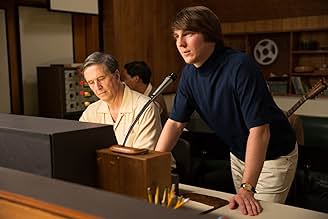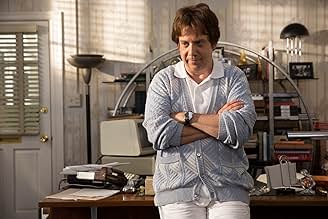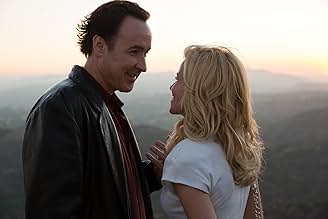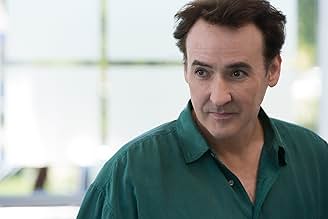In den 1960er-Jahren kämpft Brian Wilson, Gründer und Kopf der Beach Boys, mit seiner beginnenden Psychose, während er versucht, ein avantgardistisches Pop-Meisterwerk zu schaffen. In den 19... Alles lesenIn den 1960er-Jahren kämpft Brian Wilson, Gründer und Kopf der Beach Boys, mit seiner beginnenden Psychose, während er versucht, ein avantgardistisches Pop-Meisterwerk zu schaffen. In den 1980er-Jahren ist er ein gebrochener, verwirrter Mann, der 24 Stunden am Tag unter der Beoba... Alles lesenIn den 1960er-Jahren kämpft Brian Wilson, Gründer und Kopf der Beach Boys, mit seiner beginnenden Psychose, während er versucht, ein avantgardistisches Pop-Meisterwerk zu schaffen. In den 1980er-Jahren ist er ein gebrochener, verwirrter Mann, der 24 Stunden am Tag unter der Beobachtung des fragwürdigen Therapeuten Dr. Eugene Landy steht.
- Regie
- Drehbuch
- Hauptbesetzung
- Auszeichnungen
- 20 Gewinne & 58 Nominierungen insgesamt
Empfohlene Bewertungen
This is a compelling biopic of an interesting person. Paul Dano really hits it out of the park. His section has some great scenes. On its own, John Cusack does a great job. Put together, I can't help but think that Cusack is doing a passable imitation of Dano's performance. I'm not judging their relative acting skills. I just think that Dano has always played this type of character and he simply fits better. I'm certain that Dano would be nominated for an Oscar if he played both time periods. Landy is the villain of the piece and Giamatti plays him with gusto. For a more nuanced character, the movie needs to show his character saving Brian at the beginning. Splitting the time period so neatly does lessen some important sections of Brian's life.
"Love & Mercy" focuses on two times pieced together, as Pohland and the writing team of Michael Alan Lerner and Oren Moverman segway between the "past" Brian Wilson, played by Paul Dano, and the "future" Brian Wilson, played by John Cusack, never telling us exactly where the present lies. We follow Wilson during his rise with his brothers and friends to make The Beach Boys one of America's most successful boy bands in the 1960's. Despite initial success with The Beach Boys, following a severe panic attack, Wilson resigns from the band to focus on writing back home in California. He's convinced he has found the formula for "the greatest rock album ever," experimenting with a plethora of different melodies, instruments, and lyrics to create something one can not only hear and enjoy, but feel.
While undergoing this arduous process, Wilson is met with little vocal support. He receives the casual head nods from most of his bandmates, with the exception of Michael Love (Jake Abel), who constantly criticizes his creative decisions, and his father, who is still bitter after being fired by his own son. While focusing on this, we frequently jump into Brian's life in the future, where he is placed under the care of Dr. Eugene Landy (Paul Giamatti in another brutal but compelling role), who over-medicates and physically and mentally abuses him. Brian winds up meeting and falling for a Cadillac saleswoman named Melinda Ledbetter (Elizabeth Banks), who constantly wants to be with him but finds Dr. Landy to be a smothering force preventing their connection from growing.
Pohland's experimental structure for "Love & Mercy" is nothing shy of remarkable, but the fact that it doesn't make the film feel off balance or tonally uneven is a total cinematic anomaly. While frequently weaving through different time periods seems ripe for complete chaos for a film trying to keep a consistent tone, "Love & Mercy" handles the challenge beautifully, humanizing Brian regardless of his age and working to find the core idea in each scene.
I've long asserted that Paul Dano is one of the finest actors in cinema today and "Love & Mercy" is another link in his ever-growing chain of terrific performances. Similar to his role in "Prisoners," Dano must remain relatively expressionless and look as if nothing is occurring inside his head, when really, there is too much going on in his head to accurately communicate. Dano, once again, blindsides the audience by taking a role that seems too facile to carry a film and making it a fleshed out, thoroughly impressive performance. John Cusack also delivers a role much like Dano, channeling his kind of emptiness so well that it's like watching two actors in different time periods of their life playing a character in different time periods of his own life. The result is a mesmerizing, surreal experience.
"Love & Mercy"'s vignette-style structure examines the heartbreak, the joy, the contentment, and the unmatched physical and mental pressure of Brian in a remarkably tender way. Robert Yeoman's cinematography also paints a picture that, while littered with nostalgia in look, costume design, and general vibes, captures Brian's hectic environment so affectionately that it becomes strangely beautiful. Through all of Brian's madness, his unpredictable panic attacks, episodes of rage, and the contemptuous relationship with his father, Pohland searches to find attributes of Brian to showcase in a way that's impacting.
Calling "Love & Mercy" a "mesmerizing, surreal experience" is an appropriate, if ostensibly exaggerating, summation. Similar to how Brian can't always communicate the beauty behind the sound of his music, I can't quite put my finger on what works with this film and in what manner. This film, however, snuck up on me in a way that was remarkably subtle but lasting and, even though it's been several days since I've seen it, the effect remains strong in a way that only enhances the film's compelling and unique aura.
In an unusual artistic approach, Paul Dano plays Brian from the 1960's period that resulted in the revolutionary Pet Sounds album and the ongoing battle with his domineering father; while John Cusack plays Brian from the late 1980's - his most creatively bankrupt period and the subsequent debilitating influence of quackster psychologist Dr. Eugene Landy (Paul Giamatti).
The two periods are blended together as we (and Brian) bounce back and forth between the struggle of a budding musical genius working to release the sounds in his head, and a middle aged man so heavily medicated that speaking, eating and even getting out of bed are such overwhelming obstacles that music rarely registers. It's during the latter period that Brian is truly at the mercy of Dr. Eugene Landy. Giamatti sports a floppy wig and proceeds to rage at Brian while trying to charm Melinda (Elizabeth Banks), Brian's new romantic interest. Knowing this disgusting period was part of Brian's life only adds to the anger and frustration we feel not just as fans, but as human beings.
What sets this biopic apart is actually the performance of Dano and the peek inside the process of Brian's genius. Watching Brian work the musicians and mold the music on the fly is breath-taking, even though we see the challenges of his early mental issues. It's a joy to see a tribute to the studio session players known as "The Wrecking Crew" themselves the subject of a recent stellar documentary. It's during this period that the Wilson brothers' father (played by Bill Camp) constantly derides Brian and his "new" music. There is also some insight into the Brian vs Mike Love battles – Brian exploring his creative music, while Mike just wants to keep cashing in with their expected "fun" style.
Some may find the two-headed approach to be distracting, but it drives home the point of what a different man he was in comparing the mid-1960's to the late 1980's. Mostly, I found the 1960's portion to be an insight into what we hear from so many geniuses, regardless of their specialty. Brian says it's like "Someone is inside me. Not me." His struggles are non-relatable to others – even his brothers, and especially his dad. What is mostly a look at the darkness behind the "sunny" music, does come with real life redemption courtesy of Melinda's strength and witnessed in the video shown over the closing credits.
We first encounter Brian (Paul Dano) during the 1960s, shortly before the band is scheduled to head out for a tour of Japan. Reluctant to return to the road, Brian convinces his brothers that he belongs at home in the studio, where he'll be more effective at creating the band's next album. The boys finally acquiesce, and Brian hires a collection of studio musicians to begin crafting what would ultimately become Pet Sounds.
Our next encounter with Brian comes during the 1980s, where he's portrayed by John Cusack. Brian meets, and attempts to court, Cadillac saleswoman Melinda Ledbetter (Elizabeth Banks), but she quickly discovers that Brian's life is not his own when she meets Dr. Eugene Landy (Paul Giamatti), his therapist and legal guardian. Landy controls every aspect of Brian's existence, from his diet to his personal relationships, all the while insisting that he has Brian's best interests at heart.
The film frequently cuts between these two periods in Brian's life. We see the depths of his imagination and creativity as he employs a range of nontraditional elements to record Pet Sounds, desperately trying to bring to life the music he hears in his head, and all the while sliding further and further into the grip of severe mental illness. And we see the results of that illness, as Brian becomes a timid, broken man, cut off from his friends and family, allowing himself to be controlled and manipulated, and never able to find peace.
Director Bill Pohlad does a marvelous job of illustrating the parallels between each on screen version of Brian Wilson, and both actors give brilliant, emotional performances. Dano in particular turns in what can arguably be called the best work of his career, perfectly embodying Brian's childlike glee as he excitedly flits around the studio, and capturing the anguish and desperation as his mind continues to deteriorate.
Unorthodox in its approach and admirable in its complexity, Love & Mercy wisely chooses not to paint a definitive portrait of a man whose life couldn't possibly be summed up in a two-hour film. By confining the narrative to these two specific chapters, we're able to go far beyond the surface and reveal the inner workings of a tortured genius, and shed light on a story that few people are familiar with. Love & Mercy is a truly exceptional film about the internal and external struggles of a truly exceptional person, and is one of the most emotionally resonant experiences I've had with a film this year.
Wusstest du schon
- WissenswertesThe real Wilson reported having a mild dissociative experience while watching the film. He started to believe that Paul Giamatti was the actual Eugene Landy and felt "absolutely in fear" for several minutes.
- PatzerContrary to what is shown, the recording for "Good Vibrations" began during the making of "Pet Sounds", not after.
- Zitate
Brian Future: I want you to leave, but I don't want you to leave me.
- Crazy CreditsFirst, there's concert footage of the recent Brian Wilson, himself, singing "Love & Mercy", and then at the very end there is audio of a brief recreated studio recording of Good Vibrations, with '60s Brian leading the dialogue.
- Alternative VersionenThe version which premiered at the 2014 Toronto Film Festival and a few subsequent public screenings contained a few extra scenes, such as an "I Get Around" studio sequence, and a scene where Wilson meets Phil Spector on the street. The closing song "One Kind of Love" was also absent from this cut.
- SoundtracksSurfin' U.S.A.
Written by Chuck Berry
Lyrics by Brian Wilson (uncredited)
Performed by The Beach Boys
Courtesy of Capitol Records
Under license from Universal Music Enterprises
Top-Auswahl
- How long is Love & Mercy?Powered by Alexa
- Why cast two actors for the same role?
Details
- Erscheinungsdatum
- Herkunftsland
- Offizielle Standorte
- Sprache
- Auch bekannt als
- Amor y Compasión
- Drehorte
- Produktionsfirmen
- Weitere beteiligte Unternehmen bei IMDbPro anzeigen
Box Office
- Budget
- 10.000.000 $ (geschätzt)
- Bruttoertrag in den USA und Kanada
- 12.551.031 $
- Eröffnungswochenende in den USA und in Kanada
- 2.122.177 $
- 7. Juni 2015
- Weltweiter Bruttoertrag
- 28.641.776 $
- Laufzeit2 Stunden 1 Minute
- Farbe
- Sound-Mix
- Seitenverhältnis
- 1.85 : 1
Zu dieser Seite beitragen




























